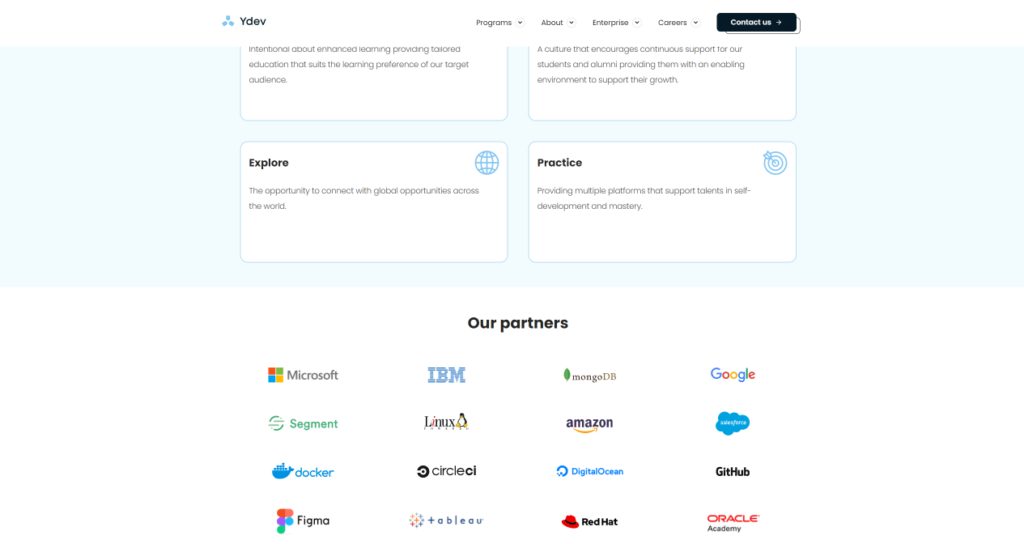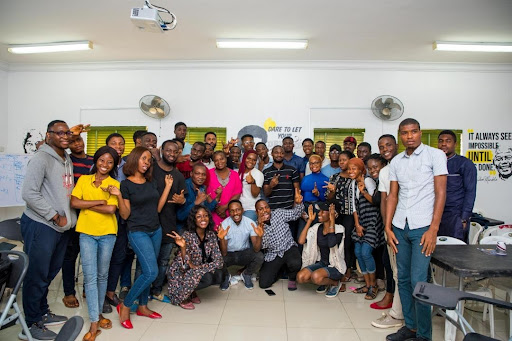Over the past decade, Africa has emerged as a place of digital innovation as entrepreneurs address development challenges using technology. But when it comes to tech talent, the continent is sometimes overlooked by global tech powerhouses.
That is quickly changing, however, as a global tech talent scarcity increases. The IMF estimates that by 2030, there will be a shortage of over 85 million tech workers across the world. This has put African developers in high demand and fueled the growth of several talent accelerators on the continent.
Ydev Academy, a Lagos-based tech talent accelerator focused on the African market, trains students and professionals who wish to transition into the tech industry in a variety of skills, and links its graduates to job opportunities at local and international tech companies.
Founded in 2019 by Bernard Okobiemen (O’Bien), a veteran software engineer, and IT entrepreneur Wilson Diamond, Ydev also helps organisations and corporate entities train, retrain and upskill their employees, as well as provides companies support while onboarding new hires.
In all, it aims to “transform up to 100,000 young adults” on the continent within the next five years.
“We are aware of the high demand for tech talents in today’s world and deeply concerned about the lack of candidates to fill these roles,” O’Bien told TechCabal in an interview. “This has made us build a strong curriculum delivered by expert-level instructors and provide world-class education facilities and placement support for our students.”
Partnerships are central to Ydev’s plan to realise its grand vision. The likes of IBM, Google, and Microsoft are among the more than 15 global technology giants the company has partnered with and which its top graduates work at.
“Our best graduating students receive strategic placements within our partner organisations in Africa, the Middle East, Asia-Pacific, Europe, and North America,” O’Bien said. “We ensure that no talent is lost.”

The most recent collaboration was with American enterprise software company, Salesforce, under which Ydev is expected to train and certify 4,000 Africa-based developers in Salesforce technologies as well as connect them with global opportunities. Earlier this year, Ydev trained over 2,000 people across five countries in the continent for Microsoft Africa.
“At Ydev, we know there are many pathways into the technology industry and into our partner organisations,” explained O’Bien, who started writing codes at the age of 17 and has more than a decade of experience working in financial services, fintech, telecoms, SMEs and startups.
“We’re constantly looking for new ways to create unconventional entry points for talent outside the traditional academic paths.” One of these entry points is the Salesforce Developer Certification, which is based on Salesforce’s Trailhead learning platform and Ydev’s training course.
An African solution to a global problem
O’Bien describes the partnership as “an exciting opportunity” for tech enthusiasts across Africa. Rightly so, Salesforce is the largest player in the cloud-based customer relationship management (CRM) space and saw a 30% boom in global demand in 2020.
“It will forge new pathways to tech careers in Africa and help bridge the gap between skills demand and supply,” he said. But why are global tech giants increasingly looking to Africa to solve the tech talent shortage?
Africa is predicted to soon have the world’s largest and youngest workforce and is currently home to some of the fastest-growing internet economies in the world.
“The potential is here,” O’Bien said. “Africans are more than capable and you see quite a number of tech companies setting up engineering teams in Nigeria and Africa at large.”

In addition to feeding foreign workforces with tech talents, Ydev’s model has the added effect of catalysing the growth of Africa’s tech ecosystems, given that its skilled graduates remain on the continent as they typically work remotely, thereby avoiding brain drain.
According to the company, its graduates are known for quickly ramping and hitting quotas 25% faster, setting records over 200% on monthly attainment, and receiving company awards.
“Employers get skilled engineers who already have experience in supporting other applications across different time zones and support structures,” O’Bien said.
The International Finance Corporation (IFC) expects about 230 million jobs across Africa to require some level of digital skills by 2030. While this need has been exacerbated by the COVID-19 pandemic, Africa lags when it comes to requisite educational infrastructure.
Companies like Ydev are crucial to preparing the continent’s youthful population for a tech-driven world.
If you enjoyed reading this article, please share it in your WhatsApp groups and Telegram channels.





















